- Home
- E. B. White
Writings from the New Yorker 1925-1976 Page 4
Writings from the New Yorker 1925-1976 Read online
Page 4
The New Yorker subscribes to a press-clipping bureau, and over the years we have examined thousands of clippings from many sources, in praise of one thing or another that has appeared in the magazine. Almost invariably, the praise begins with a qualifying remark, pointing out that the magazine is non-serious in nature and indicating that it takes a superior intelligence (the writer’s) to detect truth or merit in such un-likely surroundings. If it’s any comfort to Stevenson, we can assure him that in this matter of humor we have been in the same boat with him for a long time, and that the sea has been rough.
AFFAIR WITH HUMOR
10/5/46
SOMEBODY, perhaps suspecting that we were having an affair with Humor, sent us the following passage from Proudhon. We reprint it in free translation, with pride and embarrassment—the sort of mixed feeling you have when walking with a pretty girl and the girl is whistled at:
Liberty, like Reason, does not exist or manifest itself except by the constant disdain of its own works; it perishes as soon as it is filled with self-approval. That is why humor has always been a characteristic of philosophical and liberal genius, the seal of the human spirit, the irresistible instrument of progress. Stagnant peoples are always solemn peoples: the man of a people that laughs is a thousand times closer to reason and liberty than the anchorite who prays or the philosopher who argues.
Humor—true liberty!—it is you who deliver me from ambition for power, from servitude to party, from respect for routine, from the pedantry of science, from admiration for celebrities, from the mystifications of politics, from the fanaticism of the reformers, from fear of this great universe, and from self-admiration.
Come, sovereign, turn a ray of your light on my fellow-citizens; kindle in their soul a spark of your spirit, so that my confession may reconcile them to each other and so that this inevitable revolution may come about with serenity and joy.
Proudhon’s word is “I’ironie,” which we have translated “humor,” possibly too loosely, but at any rate with serenity and joy. After so many summers and winters living with Humor as our mistress and credit manager, seeing her blow hot and cold, running her unreasonable errands, taking her Up, we find our affection undiminished. The attachment strengthens, even as it grows more troublesome. Come, sovereign, give us a kiss. And deliver us, right this minute, from self-admiration.
3
Thoreau
THE INDIVIDUALIST
5/7/49
MAY 6TH IS THE SADDEST DAY in the year for us, as it is the day of Thoreau’s death*—a grief from which we have not recovered. Henry Thoreau has probably been more wildly misconstrued than any other person of comparable literary stature. He got a reputation for being a naturalist, and he was not much of a naturalist. He got a reputation for being a hermit, and he was no hermit. He was a writer, is what he was. Many regarded him as a poseur. He was a poseur, all right, but the pose was struck not for other people to study but for him to study—a brave and ingenious device for a creative person to adopt. He posed for himself and was both artist and model, examining his own position in relation to nature and society with the most patient and appreciative care. “Waiden” is so indigestible that many hungry people abandon it because it makes them mildly sick, each sentence being an anchovy spread, and the whole thing too salty and nourishing for one sitting. Henry was torn all his days between two awful pulls—the gnawing desire to change life, and the equally troublesome desire to live it. This is the explanation of his excursion. He hated Negro slavery and helped slaves escape, but he hated even more the self-imposed bondage of men who hung chains about their necks simply because it was the traditional way to live. Because of a few crotchety remarks he made about the factory system and because of his essay on civil disobedience, he is one of the early Americans now being taken up by Marxists. But not even these hard-working Johnnies-come-lately can pin him down; he subscribed to no economic system and his convictions were strong but disorderly. What seemed so wrong to him was less man’s economy than man’s puny spirit and man’s strained relationship with nature—which he regarded as a public scandal. Most of the time he didn’t want to do anything about anything—he wanted to observe and to feel. “What demon possessed me that I behaved so well?” he wrote—a sentence that is 100-proof anchovy. And when he died he uttered the purest religious thought we ever heard. They asked him whether he had made his peace with God and he replied, “I was not aware we had quarrelled.” He was the subtlest humorist of the nineteenth century, a most religious man, and was awake every moment. He never slept, except in bed at night.
WALDEN
12/28/46
THE MOST RECENT EDITION of “Waiden” is a Dodd, Mead book containing a hundred and forty-two photographs by Edwin Way Teale. It is an amusing specimen for hard-shelled Thoreauvians. In it they can hear one naturalist speaking to another across a hundred years. Mr. Teale supplies, in addition to the pictures, an excellent introduction and some back-ground notes for each chapter. Carrying a camera, and probably bent on elevating his life by a conscious endeavor, he went out to the pond to make a photographic record of where Thoreau lived and of what he lived for. Mr. Teale rose early to catch the mists above the water. He lay in wait for the ice to break up in spring. He went out and took pictures of Brister’s Spring and of Fair Haven Hill. He walked the tracks of the Fitchburg. He closed in on ground nut and swamp grass, on johnswort and wild grape. He even fired point-blank at a bean row and scored a direct hit.
“Waiden” is, of course, not a book that can be illustrated. The Concord woods are both tamer and wilder than they were in 1845, and besides, Thoreau was writing not about beans but about the meaning of beans—which is hard to photograph. A person who is about to encounter the text of “Waiden” for the first time should buy a small, unadorned edition, such as the pocket Oxford, which will allow him to travel light and on a high plane. I rather imagine that Henry Thoreau would feel that Mr. Teale, roaming the Concord woods on his second-hand errand, was not fronting the essential facts, not living deliberately. Nevertheless, it is easy to understand why Mr. Teale was there, easy to share his vicarious excitement and to enjoy his tardy and beautiful photographs. (I was glad to learn from one of the notes that Thoreau was thirty-six years old before he discovered that he was tying his shoes with a granny knot. A man must take courage from something these days, while tying his shoes, and that is as buoyant a thought as any.)
A book of this sort is a personal tribute rather than an illustrative work. Thoreau is the naturalist’s philosopher. The extraordinary thing about him was that he so strangely combined the curiosity, the patience, and the literalness of the scientist with the poetical and critical faculty of the artist. His contribution to limnology (the study of fresh-water ponds) is recognized by scientists. And even when he was voicing man’s highest aspirations in sentences of great power and intensity, a muskrat would somehow work its way into the thing. As long as there are men and muskrats, there will be readers who will ache to identify themselves with the spirit and the sense of this revolutionary book, this solid and everlasting book; and they will be drawn to Deep Cove in all weather and in all seasons, armed with whatever they can substitute for a borrowed axe. Teale took a camera.
THOREAU AND SHELTER
8/7/48
THE THOREAU SOCIETY wants contributions so it can buy the house at 73 Main Street, Concord, where Henry David Thoreau sat taking pot shots at the whole theory of shelter. We haven’t decided yet whether to listen to the Society or to Henry. If we heed the Society’s call, it will cost us a hundred dollars to become a one-three-hundredths owner of 73 Main, but if we take Thoreau’s advice, we’ll simply enclose a dollar to the Society and suggest that it exercise a little Yankee shrewdness and buy one of those large toolboxes that you see by the railroad, six feet long and three feet wide, bore a few auger holes in it, and set it up in Concord, thus memorializing not only the man but the Idea. Unless the Thoreau Society is careful, it is going to find itself with a museum on its
hands—a labyrinth without a clue. Nobody would chuckle more appreciatively over this, if he were in chuckling trim, than Henry. You can hear his frogs chuckling over it any night you want to walk out to the pond.
VISITORS TO THE POND
5/23/53
WHEN SENATOR MCCARTHY* turned his attention to H. D. Thoreau, the egghead of Concord, and decided to visit the Waiden country to look into the very suspicious fact of Thoreau’s pondside interlude, he asked me to go along as guide. I always jump at the chance of an outing and I agreed readily. Copies of “Waiden, or Life in the Woods” had been found on the shelves of libraries of the United States Information Service overseas, and the Senator was in a high state of excitement about it. He was particularly anxious that I accompany him to the pond, as he wanted me to read aloud from the pocket edition, which has fine print. Long hours of studying defamatory evidence have affected McCarthy’s vision, and there are days when he can hardly see anything smaller than a subpoena.
The minute we stepped from the train at the Concord station, the indescribable innocence and beneficence of Nature began having a bad effect on my companion. It was a lovely afternoon, and I suggested that we walk out to the pond along the tracks of the Fitchburg Railroad, but McCarthy refused irritably and demanded a cab.
“I’d like to walk,” I protested.
“And I want to ride,” snapped the Senator. It was a contretemps.
“A contretemps!” cried a bystander, and several other Concordians, idling on the platform, gathered around to see the fun.
Seizing the opportunity, I pulled “Waiden” from my pocket and turned quickly to page U9, knowing that I could use the text to mollify the Senator. “Here,” I said. “We’ll let Thoreau himself settle the point whether we walk or ride. Here’s the passage: ‘I have found that no exertion of the legs can bring two minds much nearer to one another.’”
“There you are!” said the Senator. “We ride.”
As I climbed into the cab behind my strong-willed companion, I could see that his spirits were mounting because of the little incident that I had so deftly turned in his favor. At the pond, we paid off the driver and I led the Senator rapidly along the path, showing him Deep Cove and the site of the cabin. McCarthy cased the woodland quickly. He explained that he liked to “get the feel” of a person’s background before going after him. As we were standing there, imbibing the past through every pore, a skunk appeared on the path, eyed us curiously, turned, and walked away. The Senator chuckled.
“What’s funny, Senator?” I inquired.
“Young man,” he replied (he kept calling me “young man,” although I am ten years his senior), “young man, one thing you’ll find out—everywhere you go in this country you’ll come across a skunk.” The episode seemed to please him immensely and his mood was now mellow. He was soon grilling me closely about Thoreau’s character, habits, and associates.
“How big was the house?” he asked.
“Ten by fifteen,” I replied.
“How big was the mortgage?”
“There wasn’t any,” I said, weakly. The Senator’s eyes narrowed. He drew a notebook and pencil from his pocket and scribbled, “Says there was no mortgage.”
“I consider it un-American not to have a mortgage,” murmured the Senator, as though speaking to himself. “Besides, it’s probably a lie.”
“Well, this case was a little different,” I explained. “The whole house cost only a little over twenty-eight dollars. That was for materials. Thoreau did the work himself.”
“I’d certainly like to see a breakdown of those figures,” muttered the Senator. So I showed him page 42 and read him the modest accounting.
Suddenly McCarthy turned on me. “Answer a simple question!” he said. “Did this man believe in the American way of life?”
“I will answer that,” I replied, “if you will tell me what you mean by the American way of life.”
A foxy smile spread across the Senator’s face as he detected the trap I had laid for him. “Young man,” he said, “I praise Americanism, I don’t define it. If you define it, you lose customers. But let’s get down to business. Let’s get to the book!”
I was more than willing. “Waiden” is the only book I own, although there are some others unclaimed on my shelves. Every man, I think, reads one book in his life, and this one is mine. It is not the best book I ever encountered, perhaps, but it is for me the handiest, and I keep it about me in much the same way one carries a handkerchief—for relief in moments of defluxion or despair. So I was glad to get to the book at this juncture. The Senator sat down on the ground and propped himself against a log, and I joined him after kicking an empty beer can out of the way.
“Read from the chapter on Economy and from the chapter on Solitude!” commanded the Senator. “Every screwball who tries to discuss economics gives himself away, and as for solitude, that’s damaging in itself. It’s un-American to live alone.”
Slipping the book from my pocket, I opened it to the first page and started to read, at first hesitantly, then gaining confidence.
“ ‘When I wrote the following pages, or rather the bulk of them, I lived alone, in the woods, a mile from any neighbor, in a house which I had built myself, on the shore of Waiden Pond, in Concord, Massachusetts, and earned my living by the labor of my hands only. I lived there two years and two months. At present I am a sojourner in civilized life again.’”
The familiar words had a new, strange sound—a sort of looseness, as though they were sifting down through the branches of the pines and skittering up from the surface of the lake. The Senator attended closely. He was obviously a good listener.
“ ‘I should not obtrude my affairs so much on the notice of my readers if very particular inquiries had not been made by my townsmen concerning my mode of life, which some would call impertinent . . .’ ”
McCarthy leapt to his feet. “Inquiries?” he snorted. “There you are. This guy was being investigated even then, and the inquiries were being called impertinent. Brother, where have I heard that before! Anyway, the townspeople must have been wise to him or they wouldn’t have questioned his affairs.”
The Senator took out his pad and noted, “Was under fire at the time.” Then he ordered me to continue reading. I com-plied, skipping around in the text as it suited my fancy, which is one of the privileges of anyone who reads to the blind or the near-blind.
“ ‘The greater part of what my neighbors call good I believe in my soul to be bad . . .’ ”
“Read that again, slower!” commanded the Senator.
I repeated the sentence.
“Well,” drawled McCarthy, “that’s a subversive statement right there. He’s going against the majority opinion of the community. Anybody who does that has no kick coming if he gets investigated.” The Senator grew thoughtful. He repeated the sentence slowly, savoring the words. “You know,” he said, “that sentence came very near being a very sensible remark. I could edit it a little and make it into something completely American, if I wanted to. All you do is just take out three words. Listen to this: ‘The greater part of my neighbors I believe in my soul to be bad.’ Now you’ve got something! Well, I’m not going to clean up Thoreau’s text for him—he’s cutting his own throat fast and I’m going to let him. But it just shows what can be done if you’re on the ball. Read some more!”
“ ‘I think we may safely trust a good deal more than we do,’” I read.
“Poppycock!” cried McCarthy. “Balderdash!” He was visibly shaken by the sound of the word “trust,” and his body was racked with shudders. He flapped his head back and forth, the way a dog fights an itch, as though trying to expunge the idea of confidence from his thoughts. I waited till he subsided, then skipped a few paragraphs and read some of Thoreau’s remarks about shelter and vital heat.
“ ‘When a man is warmed by the several modes which I have described, what does he want next? Surely not more warmth of the same kind, as more and richer food, larger an
d more splendid houses, finer and more abundant clothing . . .’ ”
“Wait a minute!” said the Senator. “Now d’ya see what I mean? This man was Communist-inspired. That accounts for his sour attitude about housing—those cracks about not wanting larger and more splendid houses, more food, finer clothing. Every good American wants a bigger house, that’s for sure.”
“What about the small ranch-type dwelling so popular today?” I asked, timidly. “The ranch-type house is an American manifestation, a concession to the compact-living school of which Thoreau was a founder. Thoreau was simply ahead of his time.”
McCarthy uttered something unintelligible. He seemed unimpressed. I was unimpressed myself, but I felt that I had met the challenge adroitly and in a manly fashion. I turned back to the book, but my companion interrupted.
“Was this fellow ever in jail?”
“Yes,” I replied.
“I thought so,” said the Senator. “Why was he in?”
“Nonpayment of taxes,” I said. This cheered the Senator and we were able to return to the text.
“ ‘For many years I was self-appointed inspector of snowstorms and rain-storms, and did my duty faithfully; surveyor, if not of highways, then of forest paths and all across-lots routes, keeping them open, and ravines bridged and passable at all seasons, where the public heel had testified to their utility.’ ”
“ ‘The public heel?’ ” repeated the Senator. “The Acheson* of his day, I reckon.” I responded to the weak joke and we laughed together. A loon on the far side of the pond heard us and laughed back, mocking us across the water. McCarthy’s face clouded at the unearthly sound. A look of anger furrowed his brow. “Nobody mocks McCarthy!” he growled. He shook his fist angrily at the bird, and tension mounted darkly in the woods. I hastily retreated to the text, wondering vaguely how this strange excursion of ours was helping the United States Information Service, which now seemed incredibly remote.

 Charlotte's Web
Charlotte's Web Stuart Little
Stuart Little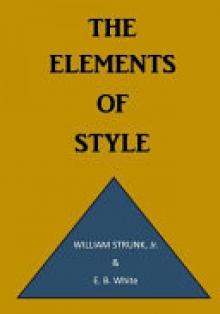 The Elements of Style
The Elements of Style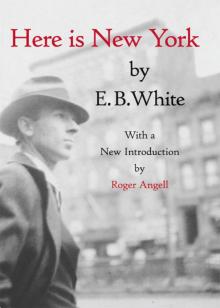 Here Is New York
Here Is New York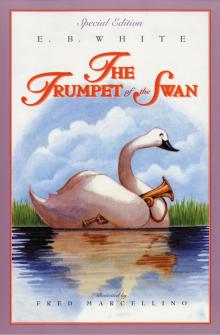 The Trumpet of the Swan
The Trumpet of the Swan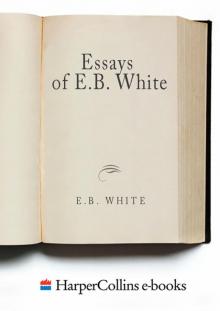 Essays of E. B. White
Essays of E. B. White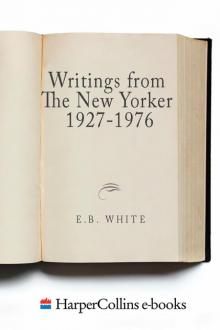 Writings from the New Yorker 1925-1976
Writings from the New Yorker 1925-1976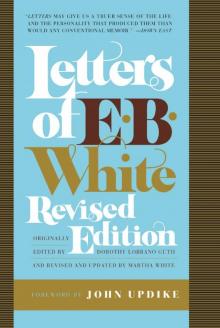 Letters of E. B. White
Letters of E. B. White